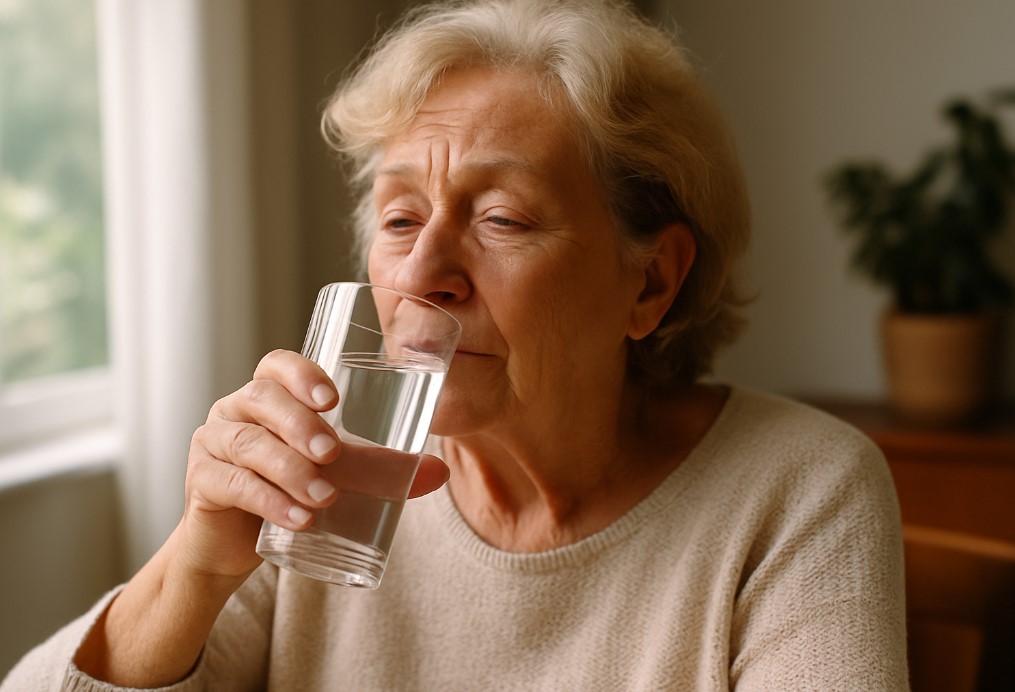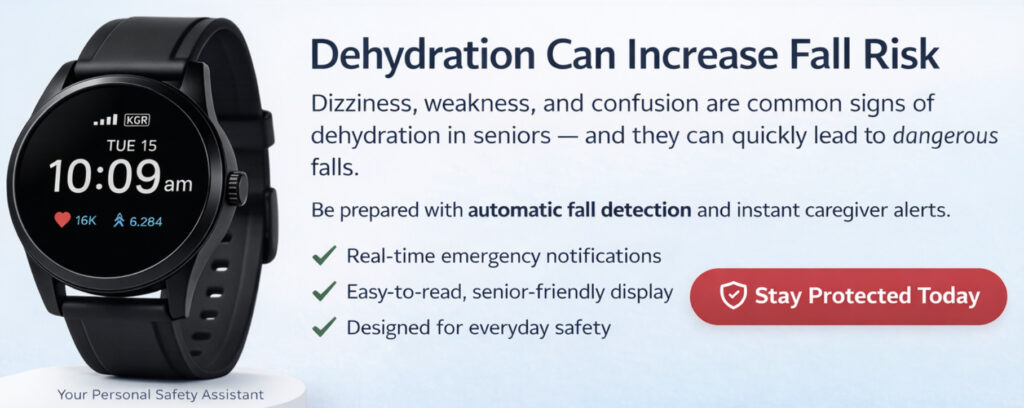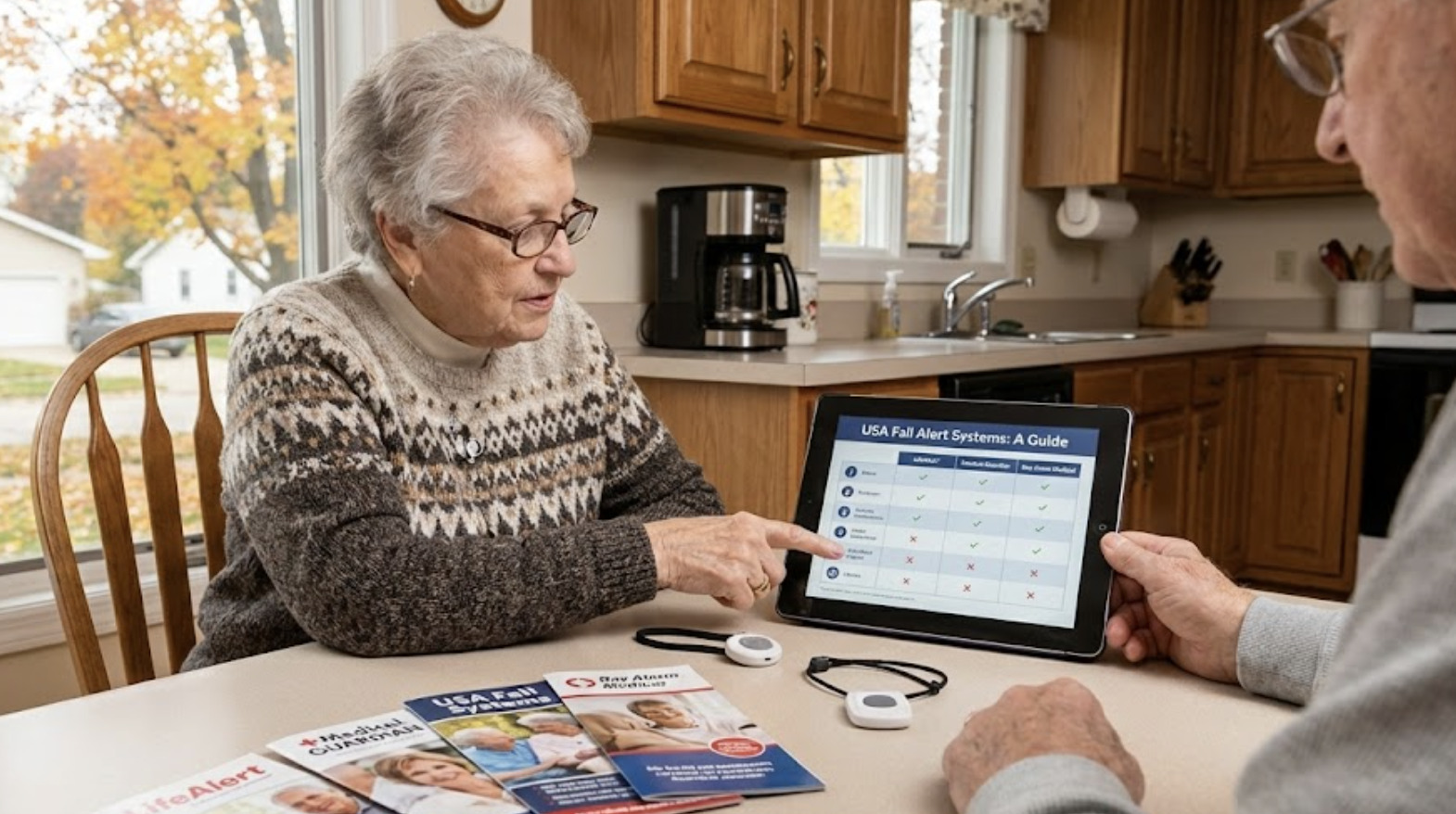Why Hydration Matters for Older Adults
Water is the foundation of health. It supports brain function, heart and muscle performance, regulates body temperature, and keeps the immune system strong. As we age, the risk of dehydration increases — not because the body needs less water, but because natural changes make it harder to stay hydrated.
Older adults can lose 2–3 liters of fluid each day through breathing, sweating, and digestion. Heat, physical activity, medications with a diuretic effect, and chronic illnesses such as diabetes or kidney disease can all make dehydration more likely.
The danger is that dehydration in seniors isn’t just about feeling thirsty — it can lead to confusion, dizziness, falls, urinary tract infections, digestive issues, and even hospitalization.

How Much Water Do Adults Need?
Daily hydration needs vary depending on age, weight, height, health conditions, and activity level. In general:
- Women should drink about 9 cups of water per day (around 2 liters).
- Men should drink about 12 cups per day (around 3 liters).
Hydration doesn’t only come from plain water. Foods like soups, fruits, vegetables, and yogurt, as well as herbal teas, also add to your fluid intake. On the other hand, alcohol and excessive caffeine can make dehydration worse.
For seniors with chronic conditions such as heart or kidney disease, fluid recommendations may differ. It’s always best to consult with a doctor to determine the right balance.
12 Common Signs of Dehydration in Seniors
Recognizing symptoms of dehydration can be tricky because thirst often decreases with age. Watch for these warning signs:
1. Thirst and Dry Mouth
A dry mouth or constant thirst may be an early signal. But many seniors stop feeling thirsty even when their bodies are already dehydrated.
2. Changes in Urine
Healthy urine is light yellow. Dark urine or a noticeable drop in how often you urinate may indicate dehydration.
3. Muscle Weakness and Cramps
Without enough water, nutrients can’t move efficiently through the body. This may cause weakness, fatigue, or painful cramps.
4. Low Blood Pressure and Heart Palpitations
Dehydration reduces blood circulation, which can lower blood pressure and, in some cases, cause a rapid heartbeat.
5. Confusion and Dizziness
Reduced blood flow to the brain may lead to dizziness, vertigo, or confusion — all of which raise the risk of falls.
6. Dry, Less Elastic Skin
Pinch the skin on the back of the hand or arm. If it stays lifted instead of quickly returning to place, it’s a sign of dehydration.
7. Dry or Painful Eyes
Lack of hydration affects mucous membranes, leading to dry eyes, redness, or discomfort. Some seniors may also find contact lenses harder to wear.
8. Headaches
Changes in blood flow can trigger headaches that worsen when bending forward or moving suddenly.
9. Constipation
When there isn’t enough water in the body, the intestines can’t add enough fluid to stools, making bowel movements difficult.
10. Reduced Sweating
Without sufficient fluids, the body can’t cool itself properly. If you notice dry skin without sweat in warm conditions, it’s a red flag.
11. Irritability and Mood Changes
Dehydration affects emotional as well as physical health, leading to irritability, fatigue, or lack of energy.
12. Heat Intolerance
Some seniors become unusually sensitive to heat. Without enough fluids, the body struggles to regulate internal temperature, increasing the risk of heat exhaustion or heat stroke.
How to Treat Dehydration
Mild Dehydration
- Move to a cool, shaded area.
- Drink water slowly in small sips.
- Replenish electrolytes naturally with foods like fruits, vegetables, dairy products, or lightly salted snacks.
Moderate to Severe Dehydration
This is a medical emergency, especially in older adults. Warning signs include no urination, rapid heartbeat, shortness of breath, confusion, nausea, or fainting. In such cases, IV fluids may be required.
Until help arrives:
- Keep the person in a cool place.
- Apply cool, damp towels or give a lukewarm bath to reduce body temperature.

Simple Tips to Prevent Dehydration in Seniors
- Drink regularly, not just when thirsty. Take small sips throughout the day.
- Eat water-rich foods. Soups, fruits, and yogurt all add hydration.
- Take medications with a full glass of water.
- Make water more appealing. Add lemon, cucumber, or berries for flavor.
- Limit alcohol and excess caffeine.
- Create hydration routines. A glass of water in the morning, with meals, and before bed helps build habits.
- Check medications with your doctor. Some can increase fluid loss.
Final Thoughts: Hydration Equals Health and Independence
Dehydration in seniors is more than a minor inconvenience — it’s a serious risk that can affect both health and quality of life. Recognizing early signs, making hydration part of daily habits, and seeking medical help when needed can help older adults stay strong, safe, and independent.
FAQ
Q1: What are the first signs of dehydration in seniors?
The earliest signs may include dry mouth, dark urine, fatigue, and dizziness. Seniors may not always feel thirsty, so it’s important to watch for these symptoms.
Q2: Why are older adults at higher risk of dehydration?
With age, the sense of thirst often decreases. Medications, chronic health conditions, and reduced kidney function also make seniors more vulnerable.
Q3: How much water should seniors drink daily?
In general, women need about 9 cups of water per day and men about 12. However, fluid needs may vary depending on health conditions and activity levels.
Q4: How can I help my elderly parent stay hydrated?
Encourage small, regular sips of water, offer water-rich foods like fruit and soups, and make hydration part of daily routines.
Q5: When should dehydration in seniors be treated as an emergency?
If a senior cannot urinate, has rapid heartbeat, confusion, nausea, or faints, it’s a medical emergency and requires immediate attention.








